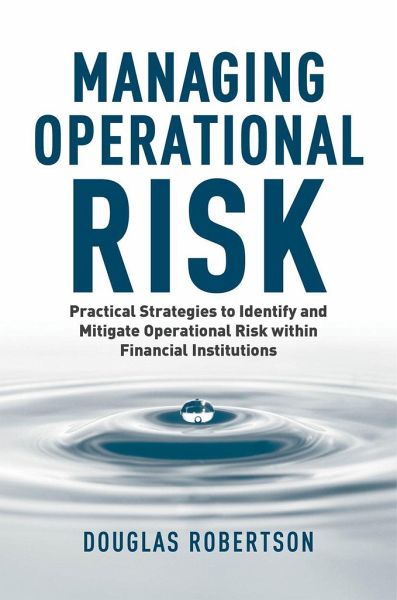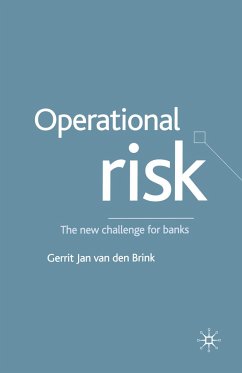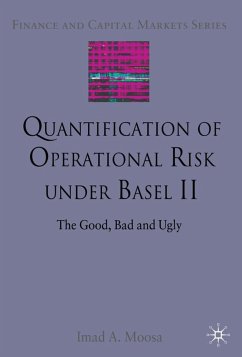
Douglas Robertson
Gebundenes Buch
Managing Operational Risk
Practical Strategies to Identify and Mitigate Operational Risk Within Financial Institutions
Versandkostenfrei!
Versandfertig in über 4 Wochen
Weitere Ausgaben:

PAYBACK Punkte
20 °P sammeln!





Operational risk is the risk of loss from inadequate or failed internal processes, people, and systems or from external events. This book explores the different types of operational risk that threaten financial institutions, and focuses on practical due-diligence methodologies that can be used to identify these risks before it is too late.
Douglas Robertson is Senior Financial Economist at Office of the Comptroller of the Currency.
Produktdetails
- Verlag: Palgrave Macmillan / Palgrave Macmillan US / Springer Palgrave Macmillan
- Artikelnr. des Verlages: 978-1-137-44215-4
- 1st ed. 2014
- Seitenzahl: 190
- Erscheinungstermin: 25. November 2015
- Englisch
- Abmessung: 231mm x 155mm x 20mm
- Gewicht: 426g
- ISBN-13: 9781137442154
- ISBN-10: 1137442158
- Artikelnr.: 43518116
Herstellerkennzeichnung
Libri GmbH
Europaallee 1
36244 Bad Hersfeld
gpsr@libri.de
'Douglas Robertson has produced an exploring and comprehensive analysis of how operational risks that threaten financial institutions can be identified earlier and can be managed efficiently within a practical and realistic framework. This is an original book which is well-written for a popular as well as a professional readership.' Roland L. Gillet, Professor of Finance, Management School of La Sorbonne, University of Paris
'Managing Operational Risk is an accessible, non-technical introduction to the topic with many examples. A unique feature of this text is the discussion of statistical quality control and structured process improvement initiatives, like DMAIC. I recommend this book to corporate and private company managers who
'Managing Operational Risk is an accessible, non-technical introduction to the topic with many examples. A unique feature of this text is the discussion of statistical quality control and structured process improvement initiatives, like DMAIC. I recommend this book to corporate and private company managers who
Mehr anzeigen
are looking for a readable and comprehensive introduction to operational risks management.' Professor Ron Kenett, Co-Author of Modern Industrial Statistics and Operational Risk Management, University of Turin, Italy and the KPA Group, Israel
"The amorphous nature of operational risk makes its measurement and management a particular challenge. This book provides a much-needed concrete approach to implementing operational risk oversight and mitigation techniques. Robertson shows how application of these common-sense auditing methodologies could have prevented the excesses in the mortgage market that led to the global financial crisis of 2007-2009." Professor Linda Allen, William F. Aldinger Chair in Banking and Finance, Zicklin School of Business, Baruch College, City University of New York
'Douglas Robertson's work introduces the reader to many angles of operational risk management in an accessible and yet comprehensive manner. It does an excellent job at illustrating how the recent credit crisis was rooted in operational risk. This book should act as an invaluable reference for practitioners, regulators, and academics who wish to gain useful insights about operational risk and modern approaches to its measurement, monitoring, and control.' Anna Chernobai, M.J. Whitman School of Management, Syracuse University
"The amorphous nature of operational risk makes its measurement and management a particular challenge. This book provides a much-needed concrete approach to implementing operational risk oversight and mitigation techniques. Robertson shows how application of these common-sense auditing methodologies could have prevented the excesses in the mortgage market that led to the global financial crisis of 2007-2009." Professor Linda Allen, William F. Aldinger Chair in Banking and Finance, Zicklin School of Business, Baruch College, City University of New York
'Douglas Robertson's work introduces the reader to many angles of operational risk management in an accessible and yet comprehensive manner. It does an excellent job at illustrating how the recent credit crisis was rooted in operational risk. This book should act as an invaluable reference for practitioners, regulators, and academics who wish to gain useful insights about operational risk and modern approaches to its measurement, monitoring, and control.' Anna Chernobai, M.J. Whitman School of Management, Syracuse University
Schließen
Für dieses Produkt wurde noch keine Bewertung abgegeben. Wir würden uns sehr freuen, wenn du die erste Bewertung schreibst!
Eine Bewertung schreiben
Eine Bewertung schreiben
Andere Kunden interessierten sich für











